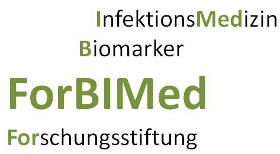FORBIMED
RESEARCH COLLABORATION - BIOMARKERS IN THE FIGHT AGAINST INFECTIOUS DISEASES

Biomarkers as a Basis for New Intervention Strategies
Projects I1 – I4 define and utilize biomarkers to characterize new drugs or vaccination platforms as a basis for new intervention (I) strategies. They benefit from the technologies and reagents made available in projects D1 – D7 and in turn provide technologies and reagents for comparative analyses, in particular for project D5 – D7.
Project I1 (Prof. Dr. Marschall, UK Erlangen / 4SC Discovery GmbH) starts from the observation that the procedures currently employed for diagnosis of HCMV infection and reactivation, which are based on quantification of viremia (e.g. qPCR), have only limited significance regarding the clinical prognosis. Complementary to the immunological biomarkers suggested in projects D5 – D7, project I1 studies if, and to what extent, virus-induced markers within the HCMV-specific signaling pathways (VSS) do allow for a better prognosis of disease progression than is currently possible. In addition, distinct components of VSS, such as JAK3, will be tested regarding their suitability as a cellular target for an antiviral therapy, e.g. with Tofacitinib. How far inhibitors directed against cellular target structures, for which a lower probability of resistance is expected, interfere with the generation and recognition of viral targets as well as the subsequent control of the infection by the adaptive and innate immune responses will be of great significance.
Therefore, the main focus of project I2 (Prof. Dr. Steinkasserer, UK Erlangen / 4SC Discovery GmbH) is the establishment of immunological biomarkers for a phenotypic description and functional characterization of selected effectors of the innate and acquired immune system. Such immunological biomarkers are also of significant importance for the development and characterization of new and improved viral vectors. Such vectors serve as a carrier for the presentation of immunogens, which are derived from pathogens against which currently no therapeutic or prophylactic vaccines are available (e.g. RSV, HIV, Dengue, and HCV). Depending on the underlying virus platform and possible genetic variations, vectors differ regarding the immunologic effector functions induced by them.
Project I3 and I4 address this with their development of two different vector platforms. I3 (Prof. Gerhard, TUM Munich / AmVac Research GmbH) introduces a Sendai-virus-based vector platform to the research consortium. This platform offers a high level of safety (negative strand RNA virus, single round), effectively infects dendritic cells in vitro and therefore is perfectly suited for the use in high risk patients, such as immune suppressed or elderly people. Empty as well as RSV (respiratory syncytial virus) transgene expressing vectors are going to be phenotypically described and functionally assessed based on different immunological biomarkers. The objective is the development of validated assays, which can be used for immune monitoring during clinical studies to evaluate the potential of the suggested Sendai vector technology in prophylactic and therapeutic applications.
Project I4 (Dr. Ruzsics, LMU Munich / Sirion Biotech GmbH) has established bacmid- and FRT-based recombination technologies, which enable the efficient production of, among others, species B and D (e.g. Ad19a) adenoviral vectors with high safety profiles in high throughput and at industrial scales. With the help of these technologies receptor specificities can easily be expanded and via libraries efficiently be screened regarding their infectiousness towards different antigen presenting cells (DC of different origins, and others) or tumor cells (oncolysis).
Within the suggested proposal adenoviral vectors with new receptor specificities will be generated and tested, initially based on the biomarkers defined in projects I2 and I3, regarding their ability to stimulate the innate and acquired immune system. In addition, the generated vector bank will be tested regarding the infection of tumor cells, to define new biomarkers for therapeutic use. Project I3 and I4 will produce recombinant viruses in their respective vector platforms expressing IE-1 and pp65, the two most prominent CMV T cell immunogens believed to control CMV replication. By comparative analysis of modified IE-1 and pp65 derivatives (project D5) and different vector platforms (projects I3 and I4) and by using different parameters, e.g. use of therapeutic agents or proteasome inhibitors (project I1 and I2) as well as incorporation of selected technologies, fundamental questions of antigen processing and presentation, DC maturation as well as stimulation of antigen specific T-cells ex vivo and in vivo, can be addressed (project D5, D7, I2).



